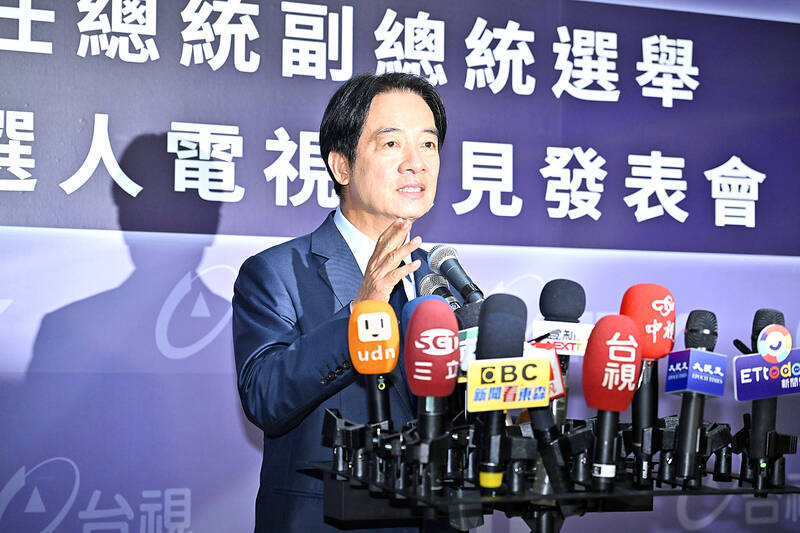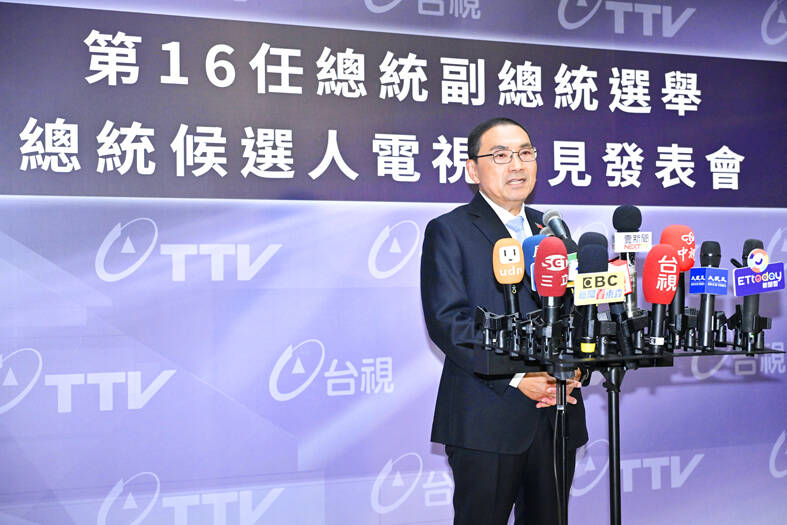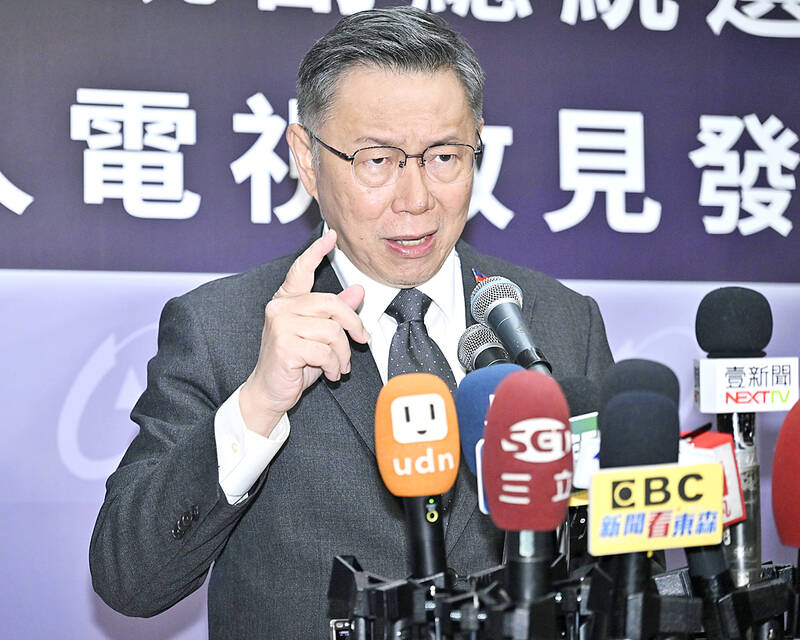Visions regarding the nation’s future and how to sustain economic growth were key issues at the three candidates’ final presidential platform presentations in Taipei yesterday.
The Democratic Progressive Party’s (DPP) presidential candidate, Vice President William Lai (賴清德), said that Taiwan has success in exporting high-tech products throughout the world.
Under the DPP, Taiwan has made friends with many countries, while safeguarding its democracy, freedom and national sovereignty, he said.

Photo: Tu Chien-jung, Taipei Times
“My policy is to boost our trade with the world so that Taiwan has a strong presence in the international community,” Lai said, adding that he is the only candidate voters can trust to continue economic growth, as the other two are advocating over-reliance on China.
Lai said that the other two candidates have spoken on the importance of peace in the Taiwan Strait and interacting with China, including restarting the cross-strait services and trade agreement, but “we must not go back to the old road of depending on China for economic growth.”
“Taiwan has the confidence to do business with many countries worldwide, and share our technology and products, while also safeguarding the nation’s sovereignty,” he said.

Photo: Tu Chien-jung, Taipei Times
Lai also said that Taiwan should open up its financial sector and welcome international investment to become Asia’s leading center for fintech, which includes banking services, information security and business management.
New Taipei City Mayor Hou You-yi (侯友宜), the Chinese Nationalist Party’s (KMT) presidential candidate, said that he and his party are following the Constitution and taking the middle road, as he castigated the other candidates for labeling the KMT as “pro-China.”
“Our party is not pushing for unification with China. If we are elected, we will certainly uphold Taiwan’s democracy and freedom,” Hou said.

Photo: Tu Chien-jung, Taipei Times
He also said that the KMT is against Taiwanese independence, but Taiwan’s future shall be decided by its 23 million citizens.
Taiwan People’s Party Chairman and presidential candidate Ko Wen-je (柯文哲) said the KMT and the DPP both could cause a conflict in cross-strait relations.
Taiwan should make friends with China, Ko said, adding that summits he organized with the Shanghai government when he was Taipei mayor was proof that he is capable of building relationships with Chinese leaders to negotiate cross-strait peace.
Taiwan should follow a “pragmatic diplomacy” to maintain its allies, but it must not return to the “dollar diplomacy of past KMT and DPP governments,” he added.
He is the only clean politician among the three candidates who is not tainted by corruption and “big money politics,” Ko said.
Ko also commented on a recent case in which a ninth grader stabbed a classmate to death, saying that there needs to be a more complete social safety net to protect young people, as well as better healthcare services.
Hou expressed sympathy over the incident and decried "deteriorating" conditions in schools, saying that strong law enforcement and punishments are needed to have a deterrent effect.
"As someone who started out as a low-level police officer, the things I hate the most are drugs, gangsters and illegal firearms," Hou said, calling for the age of prosecution to be lowered from 16 to 14.
Hou also urged for more checks against carrying weapons into school, saying that Taiwan should follow other countries in allowing police and school officials to search students and their personal effects to stop drugs, weapons and other illegal items from entering campus.
However, when carrying out a search, the whole process must be filmed and the parents must be present as witnesses, he added.
All three candidates talked about Taiwan’s healthcare, agreeing to raise wages for all healthcare workers, improve their workplace conditions, shorten their working hours and ensure government support to keep the National Health Insurance from insolvency.

A magnitude 7.0 earthquake struck off Yilan at 11:05pm yesterday, the Central Weather Administration (CWA) said. The epicenter was located at sea, about 32.3km east of Yilan County Hall, at a depth of 72.8km, CWA data showed There were no immediate reports of damage. The intensity of the quake, which gauges the actual effect of a seismic event, measured 4 in Yilan County area on Taiwan’s seven-tier intensity scale, the data showed. It measured 4 in other parts of eastern, northern and central Taiwan as well as Tainan, and 3 in Kaohsiung and Pingtung County, and 2 in Lienchiang and Penghu counties and 1

FOREIGN INTERFERENCE: Beijing would likely intensify public opinion warfare in next year’s local elections to prevent Lai from getting re-elected, the ‘Yomiuri Shimbun’ said Internal documents from a Chinese artificial intelligence (AI) company indicated that China has been using the technology to intervene in foreign elections, including propaganda targeting Taiwan’s local elections next year and presidential elections in 2028, a Japanese newspaper reported yesterday. The Institute of National Security of Vanderbilt University obtained nearly 400 pages of documents from GoLaxy, a company with ties to the Chinese government, and found evidence that it had apparently deployed sophisticated, AI-driven propaganda campaigns in Hong Kong and Taiwan to shape public opinion, the Yomiuri Shimbun reported. GoLaxy provides insights, situation analysis and public opinion-shaping technology by conducting network surveillance

Taiwan is gearing up to celebrate the New Year at events across the country, headlined by the annual countdown and Taipei 101 fireworks display at midnight. Many of the events are to be livesteamed online. See below for lineups and links: Taipei Taipei’s New Year’s Party 2026 is to begin at 7pm and run until 1am, with the theme “Sailing to the Future.” South Korean girl group KARA is headlining the concert at Taipei City Hall Plaza, with additional performances by Amber An (安心亞), Nick Chou (周湯豪), hip-hop trio Nine One One (玖壹壹), Bii (畢書盡), girl group Genblue (幻藍小熊) and more. The festivities are to

Auckland rang in 2026 with a downtown fireworks display launched from New Zealand’s tallest structure, Sky Tower, making it the first major city to greet the new year at a celebration dampened by rain, while crowds in Taipei braved the elements to watch Taipei 101’s display. South Pacific countries are the first to bid farewell to 2025. Clocks struck midnight in Auckland, with a population of 1.7 million, 18 hours before the famous ball was to drop in New York’s Times Square. The five-minute display involved 3,500 fireworks launched from the 240m Sky Tower. Smaller community events were canceled across New Zealand’s